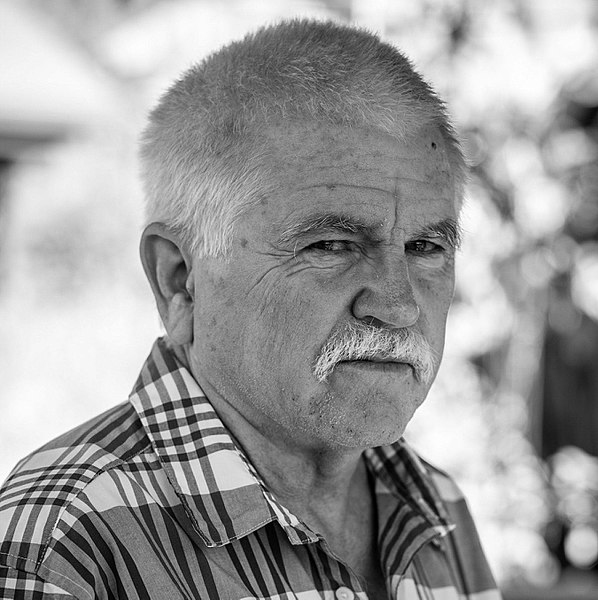
Mike Davis was a famous critic of U.S. urbanism, especially of Los Angeles, within whose great sprawl he was born and came of age. He denounced it unrelentingly. He died in San Diego October 25, age 76, and while it was a life spent almost completely in Southern California, he was always — given the sunshine, regional pleasures, and life opportunities — out of place. As magnified in his best-selling book, City of Quartz, L.A. stands in for the American knife-edge: greed, waste, and callous indifference.
As a young fellow, he was up to some of the L.A.-type hijinks: drag racing and cavorting. He was a rebel without a cause, but oh boy would that change. Somehow, he got himself into Portland’s erudite Reed College, and then dropped out from Reed College, and then after a UCLA undergraduate degree, he got himself into UCLA’s graduate history program and then would drop out of UCLA’s graduate history department. He was a first-class dropout. He would also do stints in factory work and truck-driving.
He read a lot and became a Marxist but, as with other endeavors, not a reverential one. He was a consistent contrarian, opposed to rules, the military, and most any other kind of regimentation. Precisely because of its lack of any hardened ideology, he linked up with Students for a Democratic Society (SDS) and devoted himself to the hard work of organizing national opposition to the Vietnam War and the racist practices taken for granted in the world of white people from which he came.
However unlikely from the inauspicious start-up, he was to pick up a MacArthur “genius” award, and other awards, too. For some spells, he was on faculties, including at UC Irvine and UC Riverside, but he had too much to do and too many pals to be very “professorial.” His writings made him a hero among critics (me included) who wanted change in how cities develop. He denounced elites for using cities as mere profit centers to make money. He showed how, along the way, they restricted access for those considered undesirable — right down to the spikes and decorative iron work used to keep people from lying down on a bench. Homeowners’ associations, usually treated as goodie-goodies of civic virtue, were, for Davis, persecutors pushing the downtrodden into ever more desperate circumstances.
Maybe the most prescient aspect of Davis’s writings were his warnings about the environment, particularly for what came to be called environmental justice. At a time when city officials and business leaders hardly gave a hoot, Davis focused on dead rivers, toxic air, and long-term risk. His most notorious provocation was a case he made for Malibu — actually against Malibu — “The Case for Letting Malibu Burn,” as a chapter in his book Ecology of Fear. Malibu, after all, sucks up vast public resources to fight its fires, mudslides, quakes, road closures, and water and sewer line breaks. Without the props of wealth, political influence, and a basically corrupt distribution of resources, Malibu would be uninhabitable. Meanwhile, on the distant flats, the L.A. poor struggle for basic services and breathable air. The Malibu case shows how deranged and unjust are our priorities.
What about our dear Santa Barbara? Are we not at least a bit Malibu-ish? What would Mike say? It is not rocket science to deduce he would see our “Spanish heritage” as ridiculous fealty to conquerors. He would scorn our veneration of names like Luddington, Fleishman, Keck, and Hollister — as a Great White Enemies list. He would likely revile even Pearl Chase, saint of Palm Park and so much more, and tastelessly remark that while she was guarding the red-tile roofs, brother Harold Chase was developing water-guzzling, horse-farting, rich-serving Hope Ranch. Santa Barbara may just be the most un-Davis thing in the world. He detested the whole California romance of missions, Fiesta, and myths of gay señoritas. It whitewashed exploitation of workers and migrants — never mind relegating the disappeared Chumash to a natural history museum, with rocks and the birds.
That we escaped Davis’s wrath may simply be because his own thinking moved to the scale of the whole world. If you take the worst aspects of L.A., multiply exponentially, and combine with police violence, environmental catastrophe, and utter impoverishment, you get our next world. Capitalist regimes force horrible policies, like through the International Monetary Fund, whose loan policies generate slum landscapes at scales beyond current imagining. As with other of his writings, it all amounts to dystopian horror, with few mitigating prospects.
Is there no sunshine at all?
One possible ray: Davis is just wrong. World poverty, at least by some indicators, has been decreasing. The air is getting “cleaner,” albeit disastrously warmer. Davis is given to some exaggeration; in a few cases, he even makes things up to up his drama. For him, the ocean is there to catch pollution, not to catch a wave.
Davis is a bad trip. But he is one needed now more than ever. He is incisive in getting attention for the dire crises that threaten everything. I want more of Davis to come to us, out of the hills and the flats of Santa Barbara and from wherever else. I’m all in for the Santa Barbara we cherish. But this is an emergency and Pearl Chase, like me and you, is a speck by comparison.
